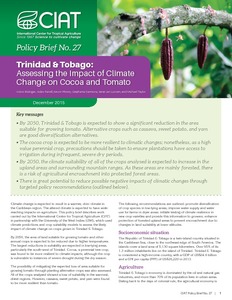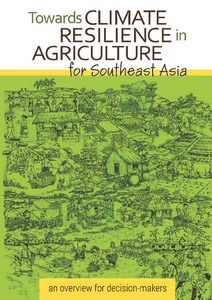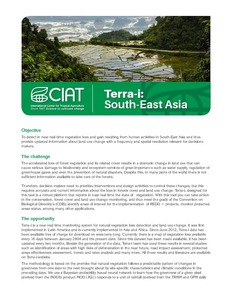Mission
To reduce hunger and poverty, and improve human nutrition in the tropics through research aimed at increasing the eco-efficiency of agriculture.
People
CIAT’s staff includes about 200 scientists. Supported by a wide array of donors, the Center collaborates with hundreds of partners to conduct high-quality research and translate the results into development impact. A Board of Trustees provides oversight of CIAT’s research and financial management.
Values
- Shared organizational ethic
- We respect each other, our partners, and the people who benefit from our work. We act with honesty, integrity, transparency, and environmental responsibility in all of our joint endeavors.
- Learning through partnerships
- We work efficiently and pragmatically together and with partners. Considering our diversity to be a key asset, we adapt readily to change and strive to improve our performance through continuous learning.
- Innovation for impact
- We develop innovative solutions to important challenges in tropical agriculture, resulting in major benefits for the people who support, participate in, and profit from our work.
Members:
Resources
Displaying 231 - 235 of 958Climate-Smart Agriculture in Kenya
The climate-smart agriculture (CSA) concept reflects an
ambition to further integrate agricultural development and
climate responsiveness. CSA aims to achieve food security
and broader development goals under a changing climate
and increasing food demand. CSA initiatives sustainably
increase productivity, enhance resilience, and minimize
greenhouse gas (GHGs) emissions. Increased planning is
vital in order to address tradeoffs and synergies between
the three pillars: productivity, adaptation, and mitigation
Climate change vulnerability in the agricultural sector in Latin America and the Caribbean
Trinidad and Tobago: assessing the impact of climate change on cocoa and tomato
This policy brief describes work carried out by CIAT in partnership with the University of the West Indies (UWI), which used climate predictions and crop suitability models to assess the likely impact of climate change on crops grown in Trinidad & Tobago. Key policy recommendations are provided.
Towards climate resilience in agriculture for Southeast Asia: an overview for decision-makers.
This sourcebook, and accompanying poster learning series, is aimed at policy makers, planners in government, local research administrators, civil society partners and researchers in Southeast Asia. Compiled and repackaged by Dr. Julian Gonsalves and a resource team, the Climate-Smart Agriculture (CSA) source book draws from a rich pool of literature from over 700 sources. The compilation provides succinct, relevant and timely information about climate challenges, and potential solutions from previously published work in a simplified or a shortened form from around the world.





